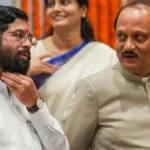The terrible murder of Santosh Deshmukh, a local sarpanch, has sparked widespread outrage and calls for accountability, bringing Maharashtra’s political scene back into the public eye as we enter 2025. In addition to highlighting the state’s urgent law and order problems, this episode paves the way for important political scheming as parties get ready for the next election. The main developments surrounding this tragic occurrence, the responses of different political groupings, and the ways in which this scenario is changing Maharashtra’s political dynamics will all be covered in this blog post.
The Event: A Heartbreaking Death
Santosh Deshmukh was discovered dead in his Ahmednagar district village on January 5, 2025, under dubious circumstances. His passing has rocked the community and sparked intense debate about safety and governance in Maharashtra as a well-respected local leader and part of the ruling coalition. His murder’s circumstances are still unclear, while preliminary reports point to possible political motivations connected to existing local conflicts.
Protests broke out around Maharashtra in the immediate wake of Deshmukh’s passing as supporters and villagers called for justice. There is a noticeable emotional toll on his family and community, and many are urging law enforcement to act quickly to catch the guilty.
Political Responses: Demands for Responsibility
A multi-party delegation has addressed Governor Ramesh Bais in response to the murder and called for Dhananjay Munde, the Minister of Social Justice, to resign. Opposition parties have questioned Munde’s purported ties to regional political groups, arguing that his stance is untenable in the wake of such a serious tragedy. This demand is indicative of a larger feeling among voters who believe that law and order has not been upheld by the current administration.
Unity of Opposition
In order to mobilise their followers against the ruling coalition headed by Chief Minister Eknath Shinde and Deputy Chief Minister Devendra Fadnavis, the opposition parties—mainly the Shiv Sena UBT (Uddhav Balasaheb Thackeray faction), Congress, and NCP—are taking advantage of this chance. They contend that larger structural flaws are demonstrated by the government’s incapacity to defend local leaders like Deshmukh.
Leaders of the Congress party have been especially outspoken, demanding a nationwide demonstration against the increase in political intimidation and violence. The opposition parties’ unity may indicate a change in direction as they aim to take advantage of public unhappiness in the run-up to this year’s elections.
Internal Conflicts: Shiv Sena Structure
The Shiv Sena itself has shown cracks as a result of the aftermath from Deshmukh’s murder. A number of activists from the Shiv Sena UBT group have unexpectedly switched to Eknath Shinde’s side. The ongoing factional conflicts inside one of the most well-known political parties in Maharashtra are highlighted by this realignment.
Since breaking out from Uddhav Thackeray’s leadership in 2022, the Shinde group has been assiduously attempting to increase its influence. Defections, however, have two sides: they may momentarily improve Shinde’s standing, but they also signal disarray inside the party. To keep its base of support, the leadership needs to carefully manage these internal dynamics.
Wider Consequences: Issues with Law and Order
Santosh Deshmukh’s murder brings up important issues regarding Maharashtra’s administration and law enforcement. Many residents are voicing concerns about community safety, especially in rural areas where political rivalries or resource disputes frequently pose a threat to local authorities.
Movement for Maratha Reservations
The ongoing Maratha reservation campaign further complicates Maharashtra’s political situation. In an effort to demand reservations for the Maratha community in government employment and education, activist Manoj Jarange-Patil has announced plans for a major march to Mumbai later this month. If not sufficiently handled, this movement, which has acquired significant steam in recent years, might further galvanise popular discontent against the ruling coalition.
The Shinde-Fadnavis government is under increasing pressure from a number of sources as tensions increase over demands for Maratha reservations as well as law enforcement concerns surrounding Deshmukh’s murder. Their chances of winning an election will be greatly influenced by how they react.
Election Planning: An Important Year Is Coming
All political parties are preparing for what looks to be a fierce campaign season as assembly elections approach later this year. Campaign tactics will probably be impacted by the aftermath of Deshmukh’s murder as parties look to engage voters on representation, safety, and governance.
Future Strategies
The Shinde-Fadnavis government needs to take decisive action to rebuild public trust in their ability to uphold law and order. This might entail quick action against those responsible for Deshmukh’s murder or more police presence in high-risk regions.
Opposition Strategy: The opposition needs to take advantage of the public’s anger and offer voters strong alternatives. They might push for stricter laws against political violence and concentrate on community safety programs.
Community Engagement: Engagement at the grassroots level with communities impacted by violence or unrest should be a top priority for all parties. Town hall meetings and listening tours may be useful strategies for restoring confidence and directly addressing constituent concerns.
Conclusion: Maharashtra’s Turning Point
The terrible murder of Santosh Deshmukh is a sobering reminder of the current political climate in Maharashtra. The consequences of this atrocity will be felt throughout the state as demands for justice increase and political parties vie for influence.
The way each party reacts to the impending elections will affect Maharashtra’s governance and public trust for years to come, in addition to their immediate futures. All parties involved—government representatives, opposition figures, and civil society organizations—must continue to place a high priority on safety, accountability, and openness during these tumultuous times while the public watches. As Maharashtra works to manage these complicated concerns and move towards a more stable future, the upcoming months will surely be crucial [1][2][4].
Citations:
[1] https://indianexpress.com/article/political-pulse/maharashtra-uddhav-sena-sharad-pawar-ncp-cm-fadnavis-supriya-sule-9760542/
[2] https://economictimes.indiatimes.com/topic/maharashtra-politics
[3] https://www.youtube.com/watch?v=DKd7pXYmCqI
[4] https://indianexpress.com/article/cities/mumbai/first-maharashtra-cabinet-2025-bjp-mlc-bank-allowed-to-open-salary-accounts-9756933/










